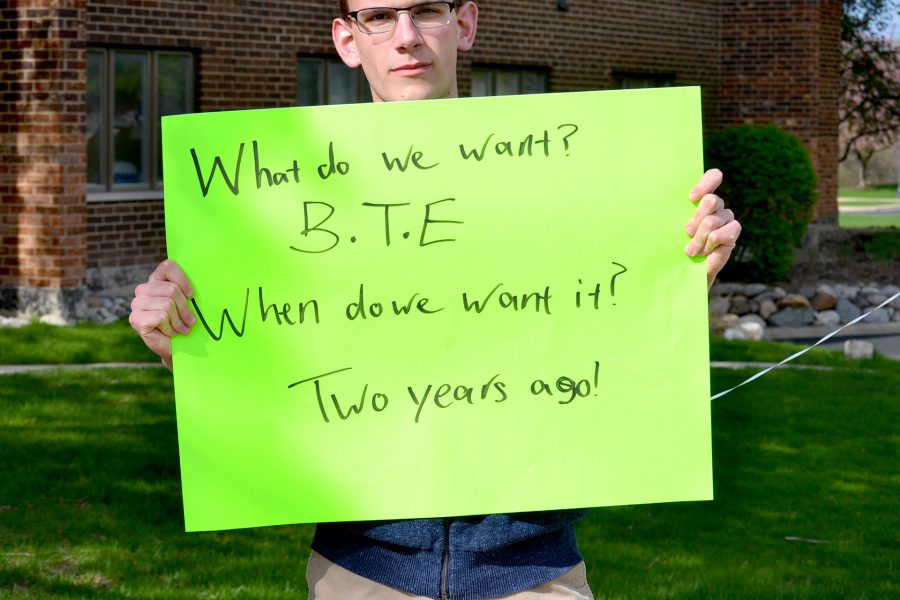BTE is Back
Board yields to protests
April 27, 2016
Brandishing signs that read “Bring the Buffalo Back,” a small but enthusiastic group of College of DuPage’s performing arts students ate pizza and danced to the sounds of music from top American artists as they awaited a decision that may have lasting impacts to the quality of theater education last Thursday.
But even after the college’s board of trustees voted to bring the Buffalo Theatre Ensemble back, it was unclear if the students got what they wanted or were just setup for a future disappointment.
Buffalo Theatre Ensemble (BTE), College of DuPage’s former resident theater company, will return to campus but under new financial requirements that some theater fans said are unfair compared to other hands-on educational opportunities at the college.
Over two years ago, the board of trustees suspended the residency of BTE and authorized the arts center to develop ideas for live performances at COD that are “financially sustainable.” The ensemble paired students with theater professionals to provide real world performing arts experiences. BTE was removed from the MAC due to its failure to raise more money to keep them running. BTE also failed to file for a 501(C) (3) status, and raise revenues through ticket sales and contributions. In fiscal year 2012 the MAC lost $519,000.
Despite the ensemble’s absence, COD still lists BTE as one of the two professional ensembles, along with the New Philharmonic that reside at the MAC on its website.
Even before the trustees’ meeting began, the information made public about the guidelines to reinstate the ensemble fueled concerns about setting the ensemble up to fail again.
“The board came back with a revised proposal for the BTE,” said Ed Garzaro, one of the student protesters. “It is a really strict proposal; it doesn’t seem like they talked to anybody from the BTE before putting it into the board’s package tonight. We are basically asking that they work with BTE in order to come up with a proposal that they can both agree on.”
Former COD students who benefitted from the presence of BTE were in attendance to support.
“Bring back BTE and generations of theatre students will thank you for this,” said a former student. They were in solidarity with their colleagues and referred to the season ticket sale requirement in the proposal by the board as an “unattainable number.” The board’s proposal mandated BTE to ensure they have 600 fully- paid, three-show subscriptions.
The board’s revised proposal called for BTE to be self-supporting, because it fits into what the “Higher Learning Commission Criteria for Accreditation Appendix” classify as an “auxiliary” function. Fears emanated from 1) likely community/audience support; 2) financial cost; and 3) whether the program could be converted into an educational program for students.
The board further stated that “as a condition of funding, BTE will form an Illinois not-for-profit corporation, seek IRS section 501(C)3 status, initiate its own fundraising and create a business plan and budget acceptance to the board.”
Former COD employees led an array of humble pleas before the board.
“These programs are integral to the word education” said a former COD professor and Glen Ellyn resident, in response to the term “auxiliary organization” mentioned by the board in its proposal. She drew the board’s attention to other projects that they viewed as “self-sustaining” but cost an overwhelming amount of taxpayers’ money.
Prior to the meeting, BTE’s documents detailed “a financial commitment from the college of approximately $131,422 for the first year of operation, with an estimated total contribution from the college of $250,444 for the first two years of operations. Beyond the first two years, it is estimated that BTE would require $80,000-$110,000.00 in college support annually. Reinstatement of BTE will also require the hiring of additional MAC personnel to support an additional 60 performances per year.”
Community members were also in support of BTE but not the tougher financial requirements.
“I have come to ask you to vote ‘no’ not on bringing Buffalo Theatre back, but on the proposal that is on the website,” said Donald Westlake. He said the board was setting the bar higher than the high jumper has ever jumped before. He felt the board meant BTE must be willing to find 600 people who are willing to put their money in the pot and bet that they will be successful. “Lastly if you don’t make it on your first try, you don’t get another try. So let’s vote ‘no’ on a plan for failure and vote ‘yes’ on a plan for success,” concluded Westlake.
The board, in response to the pleas, gave reasons for their proposal.
“The board is trying to find ways to make the program work, to try to see if the things that led to a prior departure from campus can perhaps be fixed, so that BTE has its own infrastructure to be able to survive those type of things,” said Chairman Deanne Mazzochi. She explained that from an institutional perspective, it is not appropriate for the board to take on projects in “an ad-hoc manner.”
Trustee Charles Bernstein called for a middle ground that allows the ensemble to build some momentum while also increasing financial accountability.
“I’ve read the proposal carefully, and I think the bar is impossible to overcome, and I cannot agree that it is viable,” said Bernstein.
His revised proposal called for guaranteeing funding for two years. He proposed $3,000.00 less in donations for year one, and $5,000.00 more in donation for year two.
He felt BTE provided more education to some students, and because of that he wanted to set a reasonable bar. Still on track with his colleagues, he alluded to BTE’s obligation to the IRS. A motion for substitution for the BTE’s agenda item was called, seconded by Trustee David Olsen. If his requirements aren’t met by BTE, Bernstein promised to lead the charge to remove BTE from the MAC.
Olsen supported Bernstein’s substitution, but called for a “substitution to the amendment” after he expressed different views about the substituted proposal. He wanted a phrase “out of ticket sale, and or donations,” removed from Bernstein’s proposal. After deliberations, it was placed forward for a vote. The “substitution to the amendment” failed, and the board accepted Bernstein’s proposal as presented. Student Trustee Luzenela Escamilla abstained. Mazzochi voted “no,” and all other trustees voted “yes.”



















Mambo Antonio Manyeh • May 5, 2016 at 1:49 pm
Well it always pays off to have a dynamic campus life. Thanks Candy keep it up!!